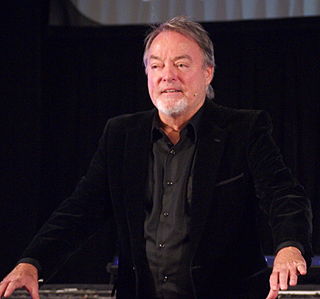A Quote by Stephen Greenblatt
A couple of years ago I picked up New Yorker writer Alma Guillermoprieto's "The Heart That Bleeds," which is reportage from Latin America in the 1990s. You can predict that some books will give you a thrill, but you can't predict the books that will hit you hard. It is a little bit like falling in love.
Related Quotes
As long as the centuries continue to unfold, the number of books will grow continually, and one can predict that a time will come when it will be almost as difficult to learn anything from books as from the direct study of the whole universe. It will be almost as convenient to search for some bit of truth concealed in nature as it will be to find it hidden away in an immense multitude of bound volumes.
Within the next five years, I predict major changes in the art world and it will look nothing like it did ten years ago. Just like the sport of skateboarding, the new innovators will define the future. I believe the art world will become more vibrant and usher in a strong healthy market for new works.
I certainly wasn't seeking any degree, the way a college confers a status symbol upon its students. My homemade education gave me, with every additional book that I read, a little bit more sensitivity to the deafness, dumbness and blindness that was afflicting the black race in America. Not long ago, an English writer telephoned me, asking questions. One was, "What's your alma mater?" I told him, "Books.
The rest, with very little exaggeration, was books. Meant-to-be-picked-up books. Permanently-left-behind books. Uncertain-what-to-do-with books. But books, books. Tall cases lined three walls of the room, filled to and beyond capacity. The overflow had been piled in stacks on the floor. There was little space left for walking, and none whatever for pacing.
They will be given as gifts; books that are especially pretty or visual will be bought as hard copies; books that are collectible will continue to be collected; people with lots of bookshelves will keep stocking them; and anyone who likes to make notes in books will keep buying books with margins to fill.
Science fiction does not attempt to predict. It extrapolates. It just says, "What if?" not what will be? Because you can never predict what will happen, particularly in politics and economics. You can to some extent predict in the technological sphere - flying, space travel, but even there we missed badly on some things, like computers. No one imagined the incredible impact of computers, even though robot brains of various kinds but the idea that one day every house would have a computer in every room and that one day we'd have computers built into our clothing, nobody ever thought of that.
It's impossible to predict which paintings will last and which won't. In New Orleans I painted on a dilapidated shop in a street littered with abandoned cars and rotting mattresses, then two hours later the piece was gone. It turned out I'd picked the side of a crack house and the proprietor didn't like the attention.
Certain signs, some of them visible to the layman as well as the scientist, indicate that we have been watching an ice age approach for some time without realizing what we are seeing... Scientists predict that it will cause great snows which the world has not seen since the last ice age thousands of years ago.




































